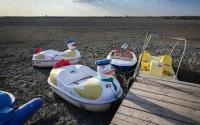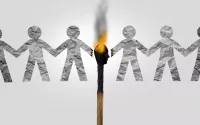8 January 2007James Cove
 The search for trapped skiers has been a familiar sight in recent days |
Many more have been buried but were dug out by the rescue services.
Four people have been killed in France, three in Switzerland and one in the principality of Liechtenstein.
Up to 75cm of snow fell last week and high winds made conditions extremely dangerous in some parts. Ski guides are warning the untrained to stay on-piste.
"It was a very poor start to the season with little snow so as soon as the snow arrived many skiers headed off-piste without realising the dangers," said Nigel Shepherd, the Alpine Safety Advisor to the Ski Club of Great Britain.
The Ski Club has trained ski hosts in most of the major resorts and it has instructed all its staff to be extra vigilant.
Lucky to be alive
In recent days, two experienced French skiers have died near Briancon. A 20-year-old local man died in Chamonix after he ducked under a safety rope and a 17-year-old snowboarder perished in Les Arcs.
 Nigel Shepherd: "A poor start to the season" |
The death toll could have been much worse. People were buried in avalanches in Meribel, Courcheval, Tignes and Val D'Isere in France. Others were buried in Saint Gall, Anzere and Trient in Switzerland.
In the French resort of Tignes two off-duty piste patrollers were buried. One was trapped under the snow for 30 minutes and is in a critical condition in hospital suffering from severe hypothermia.
It is reported that his body temperature was just 28 degrees Celsius when he was dug out.
In the neighbouring resort of Val D'Isere, a 40-year-old man was buried under a metre-and-a-half of snow but was dug out after 100 volunteers joined in the search which went on until nightfall.
A survivor's tale
Getting caught in an avalanche is a terrifying experience.
British skier Susanne Levy was recently buried at Val D'Isere when a snowboarder set off an avalanche above her.
She said: "I was skiing off piste when suddenly I heard people shouting and the next thing I knew I was knocked off my feet and engulfed in snow. My skis came off and everything went black.
"I tumbled down the mountain and came to rest upside down. The snow set around me like cement and I thought I was going to die."
She was not wearing an avalanche transceiver - a device that sends out a locating signal so rescuers can find a buried person.
However, her foot was just sticking out above the snow.
"I was able to make a small air pocket in front of my face but then I hyper-ventilated in a state of panic. I couldn't breathe, it was awful.
"I don't know how long I was buried for as my mind went blank. I will never ski off piste again without the proper equipment. I was lucky as it could have been so much worse."
Record death toll
Last year in France alone 57 people died - the worst year since records began. Across the Alps, 102 fatal avalanches were recorded, compared with 62 the previous season.
In part it was due to unusual weather conditions, but there is also the growing interest in off-piste skiing.
In resorts like Val D'Isere and Tignes it is estimated that up to half the visitors go off-piste.
In the Swiss resort of Verbier this winter, I have seen people simply ducking under safety ropes to get to fresh snow.
Wider skis mean people can learn to ski off piste much quicker than before, but they don't necessarily learn the relevant safety skills.
"Many people simply don't realise the dangers of skiing off-piste," says David George from ski website, PisteHors.
"Everyone who skis off piste should carry a transceiver, shovel and a probe. They should also check all the relevant snow and weather reports and never break the rules.
"If in any doubt they should hire a fully qualified mountain guide."
With more snow forecast to fall this week, skiers are being urged to be careful.






